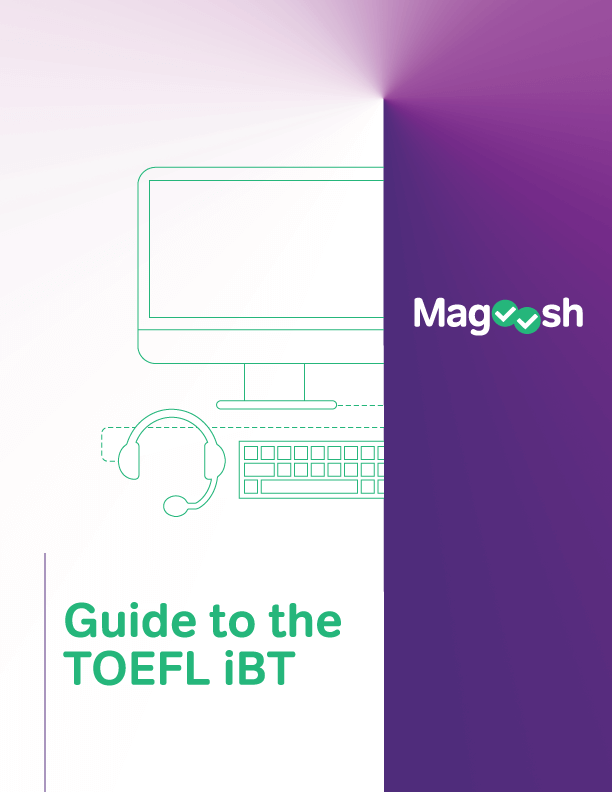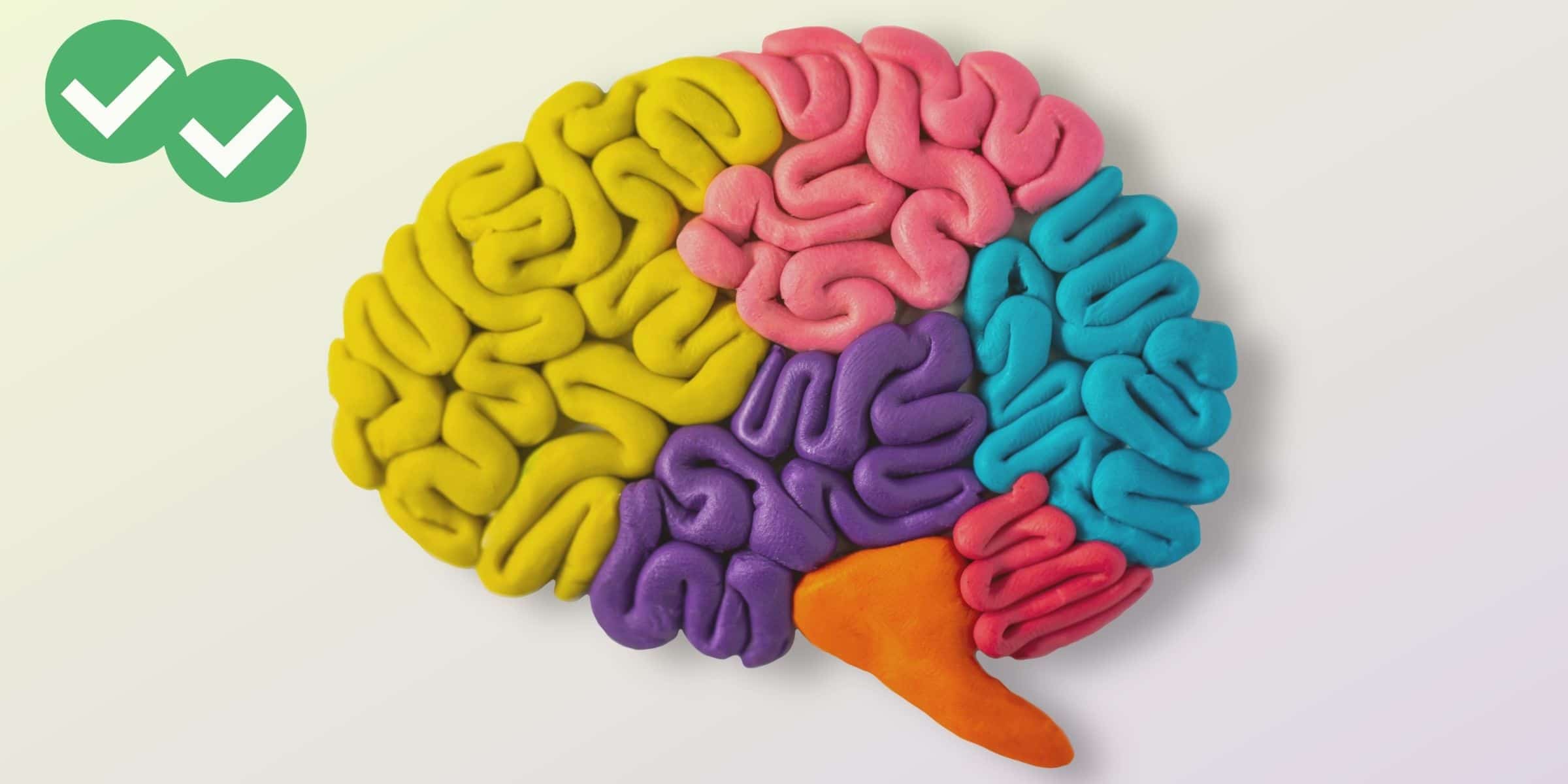
Understanding prefixes on the TOEFL– beginning parts of words that have special meaning– can help you really master TOEFL vocabulary. In this posta, we’ll do a careful study of some prefixes that are common on the exam.
Each prefix will come with a short Magoosh Comic that shows the prefix in context. After the comic, you can then see more examples of the prefix in use, as it might appear in different parts of the TOEFL.
CLICK TO JUMP DOWN TO EACH PREFIX
Prefixes in TOEFL vocabulary: over-
On the TOEFL, the prefix over- usually means “too much,” as seen in the comic below. Over– can also sometimes mean “dominating or controlling,” or “at a physically higher place.”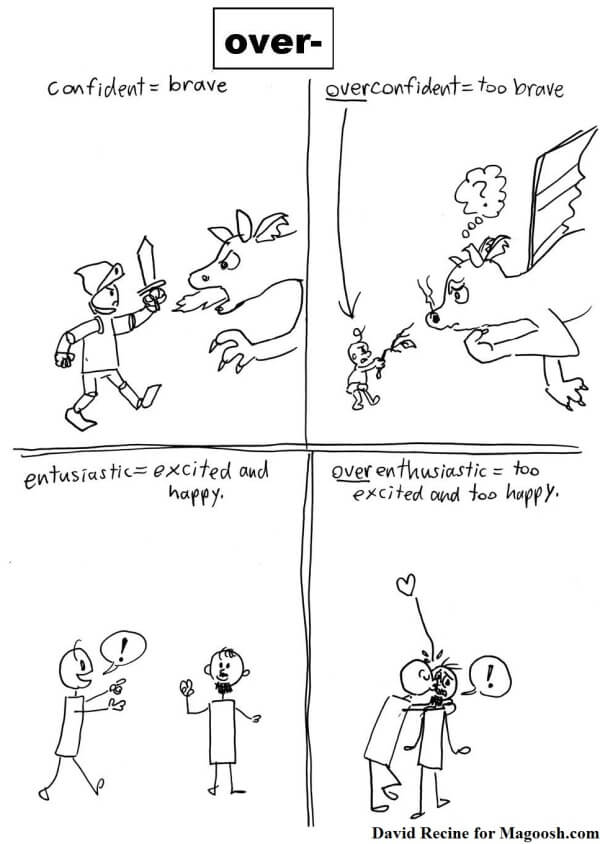
TOEFL examples of the over- prefix
- In a TOEFL lecture from an English literature class
Now, Faust was a German folktale chracter. But he really resembled the tragic heroes of Greek mythology. Faust had a tragic flaw– he was overambitious— and this flaw led to his downfall as a hero.
- In a TOEFL Reading passage
The Great Depression, an economic disaster that took place in the United States from the late 1920s to early 1930s, happened in part because stocks were oversold. Panicked investors sold their stocks in too great of quantity, at artificially low prices.
- In a conversation track from TOEFL Speaking Task 2
Did you hear about the new overpass the city is building? It sounds like it’ll make it much easier to get downtown from campus!
- In a lecture from TOEFL Integrated Writing
The passage criticizes Kurt Vonnegut’s books… basically for being too negative. The writer argues that Vonnegut’s novels had strong overtones of anger and sadness. While it’s true that Vonnegut was known for his dark comedy, there’s a lot of optimism and cheer in his humor too.
The takeaway
Notice that over- can appear in a lot of different contexts. It can also be part of just about any grammar form. In this post, we see the over- prefix appearing in nouns, verbs, and adjectives; over- is possible in other grammatical contexts as well.
Knowing this prefix can help you understand TOEFL vocabulary across many different subjects, and in a wide range of grammatical uses. In fact, you were probably able to guess the meanings of any unfamiliar re- words you saw in this post, based on your knowledge of this prefix.
![]()
The meaning of re- in TOEFL vocabulary
Re- is used in words that relate to doing something more than once… or doing something again. (A very common English word that uses re- in this sense is repeat.)
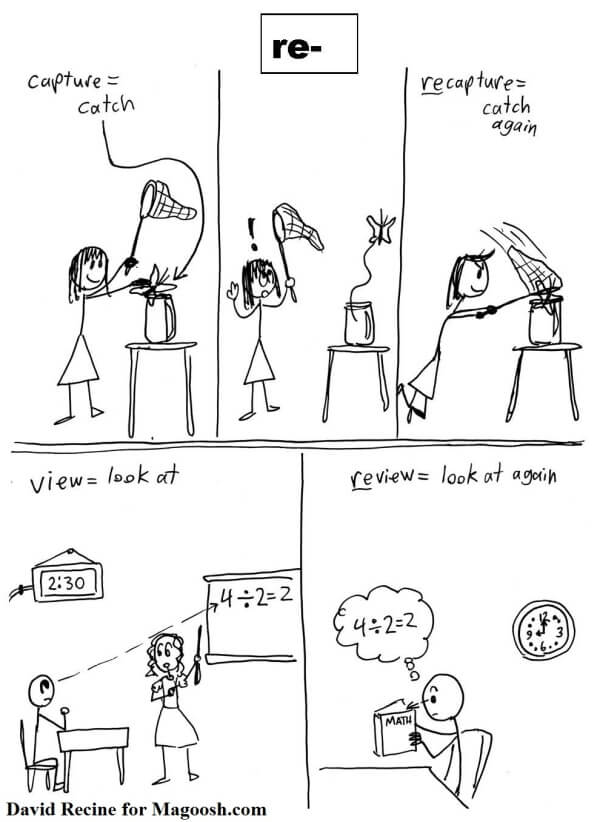
Examples of re– in TOEFL Vocabulary
- In a TOEFL Reading passage
The human kidney filters out toxic or useless waste material from the body. Useful compounds such as water, nutrients, and ions can also get filtered from the blood into the kidneys. The kidneys will send these beneficial substances back to the blood stream for reabsorption.
- In a TOEFL Listening conversation
OK, so your experiment– where you tested how fast the vines would grow– didn’t get the results you expected. Did you try remeasuring the vines? A few of your classmates just recorded incorrect measurements. And– uh– when they measured again, they realized their predictions really were right.
- In a TOEFL Speaking Task 2 conversation
Did you hear that they’re having the biology department labs renovated? Are they serious? This will be a disaster!
The takeaway
Notice that re– can appear in grammatically different words. In this post, we see re- in a noun, verb, and past participle adjective. You can use your understanding of this prefix to improve your comprehension of both grammar and vocabulary on the TOEFL.
![]()
The meaning of bi- in TOEFL vocabulary
The meaning of bi- is pretty simple– it means two! Bi– is used in words that describe two of something, or describe something that has been divided into two parts. Bi- is in the same class as other numerical prefixes such as uni– (which means one), tri (or three), and quad– (4). To see bi– in relation to other prefixes of number, read the Magoosh Comic below.
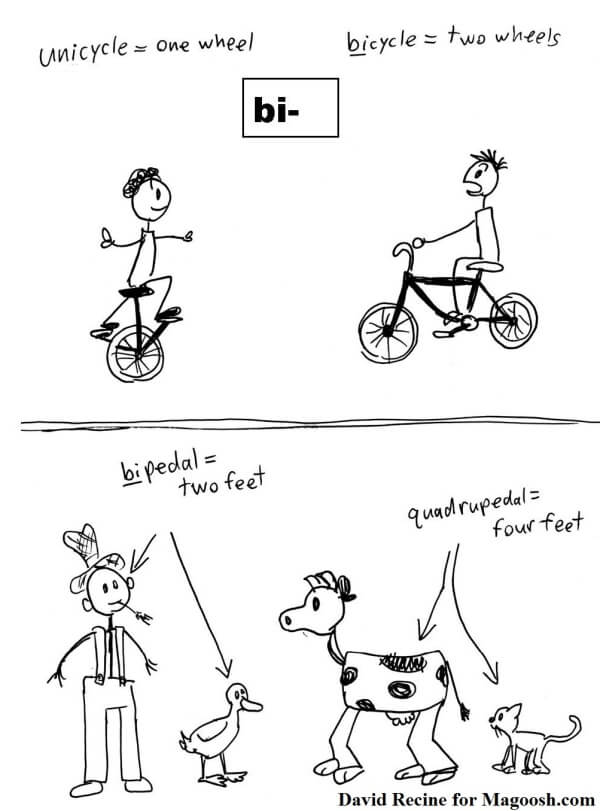
Examples of bi- in TOEFL vocabulary
- In a TOEFL lecture from a political science class
The a bicameral system… where one group of lawmakers balances the power of another…. Well, it’s a very common form of government in modern nations. But it started thousands of years ago. The plebians and patricians of the Roman Empire would be an older example.
- In a TOEFL Reading passage
Unlike classical European architects, Frank Lloyd Wright did not favor symmetry and balance in his building designs. In many cases, both the exteriors and interiors of his structures were bisected unevenly, with each distinct space in having its own unique shape and size.
- From a conversation between a student and an academic adviser in TOEFL Listening
OK, but are your really sure I’ll benefit from studying a new foreign language for the next few semesters? I mean, I don’t know if I can become fully bilingual in less than two years.
The takeaway
If you aren’t familiar with every bi- word in this post, don’t feel bad. The real value of knowing the meaning of bi- is that you’ll be better at guessing the meanings of words that contain this prefix. Use a dictionary to check any guesses you made– if you really think about prefix, grammar, and context, there’s a good chance your guesses will be correct.
![]()
The meaning of co- in TOEFL vocabulary
Co- appears at the beginning of words related to doing things together. In the comic strip below, you’ll see this prefix used to describe helicopter pilots who fly together and instructors who cooperate (another co– word!) with each other to teach a shared group of students.

Examples of co- in TOEFL vocabulary
- A lecture in a TOEFL Integrated Writing Task
The reading defines coevolution accurately, in the sense that coevolution really does involve two different life forms influencing each others’ evolution over time. But the passage is a little inaccurate in its claim that coevolution always helps both species as they evolve together. Actually, sometimes this kind of parallel, connected… evolving… can help one species while hurting another.
- A TOEFL lecture from a business class
So banks don’t want to take on liability for a loan that might not be repaid. But at the same time, these lenders want to have as many– to profit from as many customers as possible. So this where the idea of co-signing comes in. The bank will lend money to a borrower with no credit history– or even bad credit history. And a person who seems more reliable– has a better credit track record– will promise to repay the loan if the unreliable borrower can’t… or uh– doesn’t– repay.
- A TOEFL Listening discussion in an economics class
Excuse me, Professor Johnson, but doesn’t capitalism include some business models that are a little bit like communism? Like, what about– er– co-ops? Those grocery stores that are owned by the workers and the customers?
The takeaway
Notice that co- can appear in many different structures. Between the Magoosh Comic and the TOEFL-like examples, you can see this prefix as a noun and a verb. Co– also has the potential to be part of adjectives, adverbs, or other parts of speech. Also observe that co- sometimes is followed by a hyphen— a dash that separates it form its root word. Hyphenation is more common with this TOEFL prefix than with most others.
![]()
The meaning of mis- in TOEFL vocabulary
Mis- is used in words that describe an action that was done incorrectly, or a thing that is not being treated the way it should be treated. Of course, something that can be done the wrong way can be done the right way too. So words that start with the prefix mis- usually have an opposite root word that does NOT contain mis-. For instance, you can use something in the correct way, or do the opposite– misuse something in the wrong way.
In a few rare cases, a mis– word stands on its own, and you can’t make an opposite word just by removing mis-. Examples of this include the word mistake (the act of doing something in the wrong way), and misogynist (someone who does not treat women in the correct way). Take is not the opposite of mistake, and ogynist isn’t even a word! In the comic below, you’ll only see the mis- words that have a root word. I’ll give a greater variety of TOEFL-specific examples after the comic.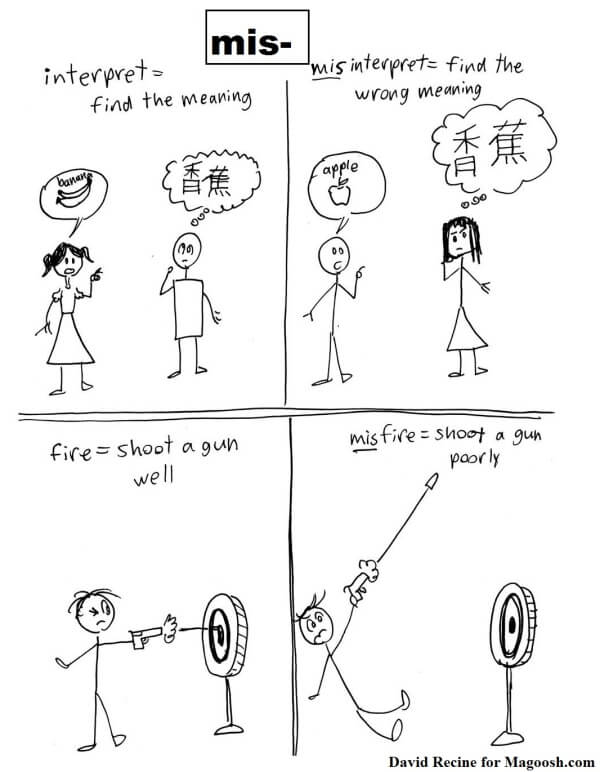
Examples of mis- in TOEFL vocabulary
- A TOEFL Listening conversation between a student and a professor
Um… I think you misread the syllabus. The course outline says this essay isn’t due until next month, see?
- A TOEFL lecture from a history class
When Christopher Columbus first came to the Americas, he thought he had landed his boat in India. This was a serious misconception. Columbus’ confusion caused him to misname the Caribbean islanders he met… calling them Indians! And you know, even today, Columbus’s mistake lives on– people still mislabel Native Americans as Indians!
- A TOEFL Reading passage
In physics classrooms, the idea of “absolute zero” is taught and studied. Absolute zero is the temperature at which atoms become so cold that they are immobilized and do not move at all. The term comes from the idea that the coldness is absolute— that once atoms can no longer move, temperatures can’t get any colder. Ultimately, scientists have come to see absolute zero as a misnomer, as research shows that it is possible to continue chilling matter to temperatures even lower than absolute zero.
The takeaway
I made a point to include misconception and misnomer in the TOEFL examples above. These two words are pretty difficult compared to most other vocabulary with the mis- prefix. It’s unlikely that you’ll see those two specific mis- words on the TOEFL. But on test day, you are likely to see at least a few similar mis- words that don’t have direct opposites. So remember to focus of the prefix itself– and not just the root word– as you study TOEFL vocabulary.
![]()
The meaning of out- in TOEFL vocabulary
Usually, out- words describe when a person or thing has done more than another person or thing. Less often, the prefix out- appears in words that describe a movement outward or an attempt to do something outside of one’s usual space. Words with this less common usage of out- may still appear on the TOEFL. Examples include outreach, which means the act of communicating with or helping others, and outcropping, a word for stones, trees, or other natural formations that stick out from the rest of their surroundings.
The Magoosh comic below shows out– in its common “more than” sense. The TOEFL examples that follow will deal with the prefix out- in all of its senses.
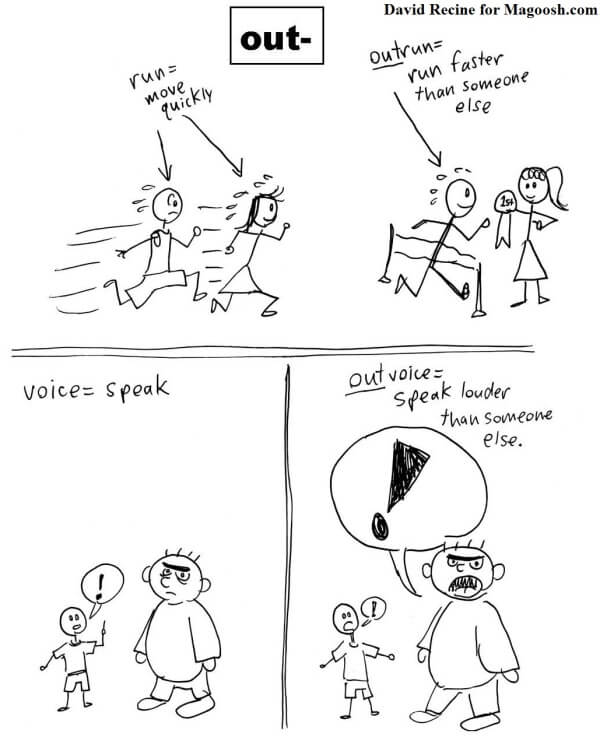
Examples of out– in TOEFL vocabulary
- A TOEFL lecture from an art history classThe Impressionist Movement can be seen as part of the outcry against photo-realistic art. With the invention of the camera, the art world began to crave art that was radically different from photos… People really got sick of realistic paintings quickly!
- A TOEFL Reading passageHorns are common adaptation in many different species of mammal. In mammal species such as the red deer or the yak, horns develop as a bone-like extension of the skull. In other species, horns are actually hair-like outgrowths surrounded by hardened excretions of keratin; this can be seen in the rhinoceros.
- A passage from TOEFL Speaking Task 3A newer, larger science facility will be built this summer, to replace the old science building. Dr. Martin Walter, the chair of the university’s science department welcomes this change, saying “Demand for classroom and lab space has really outpaced the resources we have in the current building.”



